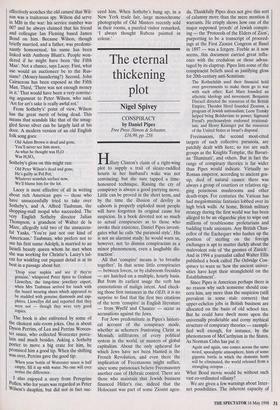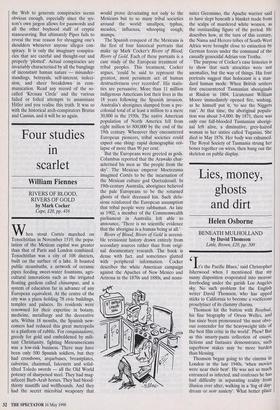The eternal thickening plot
Nigel Spivey
CONSPIRACY by Daniel Pipes Free Press /Simon & Schuster, £16.99, pp, 258 Hillary Clinton's claim of a right-wing plot to supply a trail of sleaze-raddled houris in her husband's wake was not convincing; but she sure tapped a time- honoured technique. Raising the cry of conspiracy is always a good parrying move. Little can be proved in the short term, and by the time the illusion of devilry in cahoots is properly exploded most people will have forgotten its original cause for suspicion. In a book devoted not so much to actual conspiracies as to those who invoke their existence, Daniel Pipes investi- gates what he calls 'the paranoid style'. His is not an alarmist study: he would warn us, however, not `to dismiss conspiracism as a minor phenomenon, even a laughable dis- traction'.
All that 'conspire' means is `to breathe together'. In that sense little conspiracies — between lovers, or by clubroom firesides — are hatched on a multiple, hourly basis. But from its earliest usage the verb has connotations of malign intent. And check- ing those first instances in the OED, it is no surprise to find that the first two citations of the term 'conspire' in English literature — from Wyclif and Chaucer — occur as accusations against the Jews.
For Jews predominate in Pipes's histori- cal account of the conspiracy mode, whether as schemers frustrating Christ as Messiah, infiltrators of every political system in the world, or masters of global capitalism. About the only upheaval for which Jews have not been blamed is the French Revolution, and even there the implication of Freemasons might suffice, since some paranoiacs believe Freemasonry another case of Hebraic control. There are those who maintain that Jewish business financed Hitler's rise, indeed that the Holocaust was part of some Zionist agen- da. Thankfully Pipes does not give this sort of calumny more than the mere mention it warrants. He crisply shows how one of the major supposed 'proofs' of Jewish conspir- ing — the 'Protocols of the Elders of Zion', purporting to be a transcript of proceed- ings at the First Zionist Congress at Basel in 1897 — was a forgery. Feeble as it now seems, this document carried great influ- ence with the credulous or those advan- taged by its claptrap. Pipes lists some of the conspiracist beliefs used as justifying gloss for 20th-century anti-Semitism:
The Rothschilds used their financial hold over governments to make them go to war with each other; Karl Marx founded an atheistic ideology and movement; Benjamin Disraeli directed the resources of the British Empire; Theodor Herzl founded Zionism, a program of Jewish nationalism; Leon Trotsky helped bring Bolshevism to power; Sigmund Freud's psychoanalysis endorsed irrational- ism; and Henry Kissinger put the resources of the United States at Israel's disposal.
Freemasons, the second most-cited targets of such collective paranoia, are patchily dealt with here; so too are such groups as the Knights Templar, the Bavari- an 'Illuminati', and others. But in fact the range of conspiracy theories is far wider than Pipes would indicate. Virtually no Roman emperor, according to ancient gos- sip, died of natural causes: there was always a group of courtiers or relatives rig- ging poisonous mushrooms and other death-traps. For centuries the Vatican has had megalomaniac fantasies lobbed over its high brick walls. At home, British military strategy during the first world war has been alleged to be an oligarchic ploy to wipe out millions of troublesome proletarians and budding trade unionists. Any British Chan- cellor of the Exchequer who hashes up the position of sterling on the foreign exchanges is apt to mutter darkly about the malevolent role of 'the gnomes of Zurich'. And in 1994 a journalist called Walter Ellis published a book called The Oxbridge Con- spiracy to warn us 'how the ancient univer- sities have kept their stranglehold on the Establishment'.
Since Pipes is American perhaps there is no reason why such nonsense should con- cern him, any more than the suspicion (still prevalent in some stale corners) that upper-echelon jobs in British business are allocated on the basis of old school ties. But he could have dwelt more upon the universally predictable and corny mythical structure of conspiracy theories — exempli- fied well enough, for instance, by the phenomenon of McCarthyism in the States. As Norman Cohn has put it:
Again and again, one comes across the same weird, apocalyptic atmosphere, hints of some gigantic battle in which the demonic hosts will be eliminated, the world released from a strangling octopus . . .
What Bond movie would be without such vast co-ordinated villainy?
We are given a few warnings about Inter- net possibilities. The inherent capacity of the Web to generate conspiracies seems obvious enough, especially since the sys- tem's own jargon allows for passwords and all the other boyhood stuff of cryptic manoeuvring. But ultimately Pipes fails to reveal the true reason for shrugging one's shoulders whenever anyone alleges con- spiracy. It is only the imaginary conspira- cies that are careful and thought-out and properly 'plotted'. Actual conspiracies are invariably characterised by all the bunglings of inconstant human nature — misunder- standings, betrayals, self-interest, indeci- sion, and sheer breakdown in com- munication. Read any record of the so- called `Kreisau Circle' and the various failed or foiled attempts to assassinate Hitler and you realise this truth. It was so with the historical arch-conspirators Brutus and Cassius, and it will be so again.



























































 Previous page
Previous page